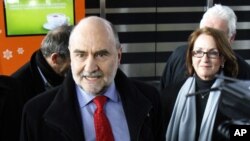United Nations inspectors say a visit to Iran aimed at gaining greater access to key nuclear sites and scientists ended in failure, as the Islamic Republic's supreme leader warned no obstacle would derail his country's nuclear program.
International Atomic Energy Agency chief Yukiya Amano said Wednesday Iran rejected a request to inspect the Parchin military complex near Tehran, suspected of housing a secret underground nuclear facility. He said Tehran refused to allow his team to interview scientists or engage in substantive talks about Iran's nuclear course.
Watch video of IAEA's Amano
In a defiant response, Supreme Leader Ayatollah Khamenei said Iran's atomic work will continue despite "pressures, sanctions and assassinations," and that the country is not seeking nuclear weapons.
Chief inspector Herman Nackaerts called Wednesday's talks "disappointing." He said the IAEA had gone into its latest visit - and a previous, inconclusive one last month - "in a constructive spirit," but that "we could not finalize a way forward."
He said the IAEA's next steps will be determined after his team reports to the agency's chief and its board of governors, which is scheduled to meet early next month.
France denounced Wednesday Iran's failure to give U.N. inspectors full access to its nuclear sites as another "missed opportunity" that could undermine chances of reviving wider talks between Tehran and world powers.
Israel and the United States have not ruled out the use of force to stop Iran from building a nuclear weapon. Tehran has threatened to take its own preemptive military action if it believes its national security interests are being threatened.
Russian Deputy Foreign Minster Gennady Gatilov warned Israel on Wednesday that attacking Iran would be "catastrophic," and played down the failure of the IAEA's latest mission to Tehran, saying there is still a chance for new talks.
Russia and China, as well as many Western nations, are concerned that any military action against Iran could engulf the Middle East in wider war, which would send oil prices rocketing at a time of global economic troubles.
Israel and Western powers accuse Iran of trying to develop nuclear weapons under cover of a civilian energy program, a charge Tehran denies.
Some information for this report was provided by AP, AFP and Reuters.
| Join the conversation on our social journalism site - Middle East Voices. Follow our Middle East reports on Twitter and discuss them on our Facebook page. |




